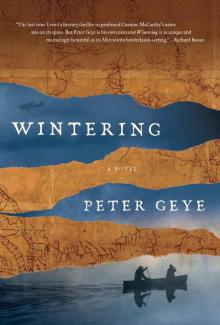- Home
- Peter Geye
The Lighthouse Road
The Lighthouse Road Read online
The Lighthouse Road
Peter Geye
Against the wilds of sea and wood, a young immigrant woman settles into life outside Duluth in the 1890s, still shocked at finding herself alone in a new country, abandoned and adrift; in the early 1920s, her orphan son, now grown, falls in love with the one woman he shouldn’t and uses his best skills to build them their own small ark to escape. But their pasts travel with them, threatening to capsize even their fragile hope. In this triumphant new novel, Peter Geye has crafted another deeply moving tale of a misbegotten family shaped by the rough landscape in which they live—often at the mercy of wildlife and weather—and by the rough edges of their own breaking hearts.
Peter Geye
THE LIGHTHOUSE ROAD
Again, For Dana
And
In Loving Memory Of
My Mother, Susan Geye
(1943–2011)
I will greatly multiply thy sorrow and thy conception;
In sorrow, though shalt bring forth children.
Genesis 3:1 6
I.
(November 1896)
Some ancient cold had taken root in Thea Eide’s belly, a feeling she’d not yet had but one she knew meant the time was nigh to deliver her baby. She wanted to walk, felt she must walk. So she rose and stepped into the mess hall and lit a candle. She steadied herself with one hand on the long table, cradled her belly with the other, and began pacing up and down the hall, measuring her contractions by those laps around the board. The contractions started in the small of her back and reached around to her belly, where they paused and clenched. She paused, too, when the contractions burrowed in, and in the throes of each the absolute chill of the large room was brought down on her. In Norwegian, her mother and only tongue, she said, “My God, what now?”
She decided to start a fire. From the tinderbox she took the last scrolls of birch bark and set them under the wood already piled in the stove. She struck a match and lit the birch bark. The fire flared directly and before her next contraction the room was already warming. The mice sought the heat beneath the stove without the least fear, gawking at her with eyes the size of pencil tips.
She heard the wind raging outside but was unaware of the snow until she unlatched the door and pushed it open. The dark night was gleaming with snowfall. So much snow that she realized the impossibility of crossing the camp to the jakes. She said, “Mercy,” then hiked up her nightdress and leaned against the mess-hall wall.
When she stepped back into the mess she saw Abigail Sterle readying water for tea. “I’ll wake the brothers,” Abigail said. The sound of the old woman’s voice was a revelation. For more than a year Thea had worked beside Abigail without having heard it plainly. Abigail said no more, only braved the blizzard herself, leaving Thea to wonder why the brothers needed to be woken.
Since Thea discovered her pregnancy, she had avoided its consequences entirely. She had not made plans of any sort, had not prepared herself for the child’s arrival, had not considered how she might keep cooking for the jacks and raise an infant, much less how or where she might deliver the babe. Pacing the mess hall again, the candlelight casting eerie shadows over the pine-board walls, the fire rasping in the stove, she realized how imprudent she’d been. She thought, I’m foolish. Even as she reprimanded herself, another contraction — the strongest yet — clutched her womb.
What little she knew of these goings-on came from two memories. The first was of her mother in labor when Thea herself was but five years old. This was back in Norway, in their hovel on the treeless banks of Muolkot, across the harbor from Hammerfest. Candlelight flickered there, too, and her mother braced herself in bed, alone, while she labored. Her mother never made a sound beyond her harried breathing, and when the child was born still, she merely wrapped it in a blanket and set the corpse on the puncheon floor.
The second memory was more recent. As Thea voyaged across the Atlantic just more than a year before, her cabinmate had gone prematurely into a terrible labor. Thea fetched the ship’s surgeon herself, and during the tailing hours of a rough storm, she watched that child come into the world stillborn, too, so small the mother could hold it in the palm of her hand while she wept. In the early throes of her own labor, Thea understood the silence of her mother and the ululations of that woman aboard ship equally.
Abigail Sterle returned, bringing with her a gust of cold air and snow. She paused to feel Thea’s forehead, to make them each a cup of tea. “Drink this,” she instructed, then slunk into their chambers. When she returned to the mess hall a moment later she came carrying Thea’s eiderdown, her cape, her woolen hat. “Dress,” she said. “We’ll cover you with the goose feathers for the ride to town. I forgot your boots.”
Thea was about to take another step in her birthing march, but stopped. There was a sluice between her legs, an almost audible pop, and her socks were soaked with something warm and thicker than water. And then there was mud on the dirt floor. Abigail came with the boots, knelt before Thea, and said, “You’ve broken water.” She pulled Thea’s wool socks from her feet, put on her boots, and laced them up.
Outside, the camp foreman’s horse stood harnessed to his sleigh in the first inkling of light. The snow had buried everything. Thea was set in the sleigh, Abigail sat next to her, and the taller of the Meltmen boys took the reins and stood between the women’s four feet. His brother went into the mess to start the baking. As the horse pulled the sleigh past the jacks’ quarters, Thea saw the old bull cook walking toward the mess. No doubt on his way to help with breakfast in her absence. He was the last thing Thea saw before they turned up the ice road and into the trees.
She didn’t open her eyes again until they reached Gunflint a half hour later. Closer to the lake, the blizzard had a different shape and unruliness. Snow had drifted into sharp ridges all along the break water. In town — or what passed as town — the roads were covered in snow, so even the horse had trouble passing. There was no sound from the mill. The lights in the Traveler’s Hotel lobby were unlit. Even the dogs that usually ran the streets were nowhere to be seen. At Grimm’s apothecary, though, the large front window was aglow. The only sign of life in town. Frost crept down from the corners to cloud the glass.
Thea was by then in agony, but still she bore it. The Meltmen boy picked her up and trudged through the knee-deep snow to Grimm’s door, where he hammered on the glass. Before a minute passed he hammered again, and Hosea Grimm’s daughter, Rebekah, came hurrying across the storeroom floor. She opened the door and said, “Oh, dear,” and turned and hollered, “Hosea! Hosea! It’s Thea. Hurry.”
Inside the store the smell of roasting capon hanging in the air sickened Thea. She said, “Stink.” To which Rebekah replied, “That’s Thanksgiving dinner already in the oven.”
The Meltmen boy set Thea on her feet, tipped his hat, and left as though he’d just delivered a parcel.
Hosea Grimm, dressed only in his union suit and a matching toque, came down the stairs two at a time. “None of us was sure we’d get you here in time, Miss Eide. How far along are you?”
Thea, answering, fell into Grimm’s ready arms.
She labored to the reassuring sound of Hosea Grimm’s deep voice. He bent beside her, dressed now minus the collar he usually wore, his shirtsleeves rolled to the elbow, an apron cinched around his waist. Next to him, resting on a music stand, Hunter’s Anatomy of the Gravid Uterus stood opened. He read from it while Rebekah listened intently and arranged a tray of medical implements. Thea’s pain was rising now — she thought she could see it coming, swell after swell — like storm breakers on the shores of Hammerfest. She moaned as the contraction passed and then settled back into the cushion of pillows Rebekah had placed behind her.
By what strange calculus could she measure the distance between the shores of her childhood in Hammerfest and her laboring on this table in Gunflint? For all of Rebekah’s tenderness, Thea wanted her mother now. More than anything she wanted her mother. She called her name.
Another contraction gripped her, and she was brought back to the bed, to Rebekah’s steady hand on her own. Grimm was speaking now of his years at the Sorbonne, of his studies with the great Jean-Philippe Armand, of the accoucheur’s duty. He had studied two years with Armand, had even cowritten several articles with the man. Or so he said.
He was in fine form, Grimm was. He lectured on the curative powers of ground stag antlers and dried rabbit wombs and a dozen other equally strange remedies for everything from infertility to gonorrhea. He suggested that when the child finally came they ought to read its skull — caul forecasting, he called it. Finally he spoke of his great affinity for Soranus, a second-century Grecian who had been Grimm’s first introduction to the science of gynecology. He held forth while he worked, as though his monologue would both edify and distract. Thea, of course, could hardly understand a word he said.
Grimm had two pots of boiled water beside him now, and he was soaking the instruments that Rebekah had earlier arranged. He said, “Well, Miss Eide, what say we welcome this child before dark? Let’s earn our sup.”
He spread her legs gently, sliding the sleeping gown over her knees. “We must have a look, child.” Then he reached into her and pressed and she thought surely this was the first touch of death. She put her hands around her neck and pressed and felt her pulse like hammer blows on the palms of her hands.
“Very good, child. Excellent. You must be halfway there. No doubt you’ll be done by suppertime,” Grimm said.
She looked at him uncomprehendingly, looked at Rebekah, who had not moved from her side for many minutes. Outside the window she could see the snow still falling.
The morning passed with difficulty. Several times Grimm consulted his library, and his discourse on the history of childbirth gave over to more imminent concerns. He twice sent Rebekah to his stores, once for morphine and later for a vile of scopolamine. Thea closed her eyes at noon and did not open them again until two hours later, when Grimm injected her with another syringe of cold drugs. The moaning that had issued from Thea for hours ceased, and she felt nothing, only that she no longer existed.
It was in this state that the child was born. The umbilical cord was tangled around him, and when Grimm held him up by the feet, even the blood coating him looked blue. The child had a huge shock of hair on his misshapen head and his eyes were but slits. Grimm reached for a long-bladed scalpel. He gripped the umbilical cord and sliced through it as though he were cutting tenderloin from the shoulder, catching the child in the crook of his arm. He unwound the cord, first from the infant’s neck and then from his legs. Almost instantly a flush of paleness washed over the boy and he was alive.
Grimm laid the child on a blanket and Rebekah bathed him, she suctioned the mucus from his throat and nose, and when she did he let out his first wheeze. While Rebekah tended to the boy, Grimm stood aside, rubbing his own furrowed brow. He watched the child open his eyes, he counted the lad’s fingers and toes, he noted his hair. He documented his findings in a notebook and set the notebook nearby and when the child was cleaned and swaddled, he took him from Rebekah and handed him to Thea, who looked wan but relieved. She held the boy. Smiled. Then wept silently. He recorded this in his notebook, too.
“You’ll need a name for this one,” Grimm said in stuttering Norwegian. He’d been practicing her language that season.
Thea looked at Grimm. “A name?” she repeated. She looked at her child, pulled him from his place nestled in the warmth of her neck, and rubbed his cheek. It was so soft it could have been satin. “Odd Einar,” she said. “I will call him Odd Einar. For my father.”
Now the child began a long, wheezing lamentation. He clutched the air with his balled fists and kicked under his swaddle. Thea tried putting him back in the crook of her neck but the child still wailed. She looked at Grimm. She looked at Rebekah, who ushered Grimm from the room and returned to her bedside. The child still cried.
“Thea, the child is hungry. Here,” and she pulled the loose sleeping gown over Thea’s shoulder, exposing her breast. “The child wants to eat.” Rebekah took the child from Thea’s arm and told her to sit up. Then Rebekah positioned the child in Thea’s lap and said, “Offer him your breast. Milk, Thea. He wants milk.”
When Thea looked up uncomprehendingly, Rebekah cupped the baby’s head in one hand and Thea’s breast in the other and brought them together.
And before Thea could fail, the child opened his mouth and leaned toward his mother’s breast. The child sucked with astonishing vigor. He sucked and he sucked and Thea felt the life going into him, drop by precious drop. In that instant she realized she was famished herself. The smell of the roasting birds was delicious now, and she felt she could eat a whole hen.
But she watched her boy suckle instead. He ate and ate. And Thea wept. And wept. And was elated.
And would soon die.
II.
(July 1920)
Odd stood out on the point, watching the distant lightning in the east, watching the moonrise in the vacuum of the leaving storm. He could feel the booming surf under his feet, vibrating up through the basalt. He could feel the weather lowering, too, behind his glass eye.
Another swell pounded the beach. He looked behind him, at the water in the cove, at his fish house and skiff. He checked his wristwatch against the moonlight. Just past eleven.
He stayed on the point long enough to imagine star trails. Long enough to imagine everything that could go wrong out there. He didn’t have a choice, though. If he balked, Marcus Aas and his brother would get the next job. Odd needed the next job.
He checked his watch again. The lightning was now just flickering over the horizon, like a premature and sputtering sunrise. He knelt, put both hands flat on the rock, felt what it told him: He’d get wet, no doubting that. But there was moon enough. And he was game.
Back in the cove he emptied his skiff, brought the fish boxes up to the fish house. He grabbed line from a hook on the wall and his spray hood. He made a cheese sandwich and wrapped it in wax paper and put it in his pocket. He took the teakettle from the stovetop. It was sweltering inside the fish house and he wiped sweat from his face and cussed. But he smartly donned his oilskin pants and jacket.
At the waterline he untied his skiff and walked it down the boat slide and into the cove. He lowered the Evinrude and turned for the open water. He rounded the point as far offshore as possible dodging the swells as much as he could. But still he was wet right away. He motored past the breakers and in the open water the seas spread out and his ride smoothed.
He passed a set of his gill-net buoys and kept the nose of his skiff pointed east, using Six-Pine Ridge as his marker ashore. The moon was above him now, its light pooled over the lake, over the hills. Twice he checked his watch and when it was finally one o’clock he lit his lantern and hoisted it up one of the oars. He lashed the oar to the gunwale. He settled into the shipping lane bearing northeast, taking the swells on his port bow. He took the cheese sandwich from his pocket and ate it. The pulsing behind his glass eye kept a steady pace with the rolling seas.
He cruised for another hour before he saw the far-off light of his rendezvous. It was nearly two o’clock by then and he knew he’d be lucky to beat the dawn getting back to shore.
The oncoming boat made steady progress. She’d done the lion’s share of traveling that night, forty or fifty miles up from Port Arthur. He could see that the boat — as big as a towboat, and cut like one, too — was suited for seas like these. Much better suited than his skiff. He thought for the millionth time of the boat in his mind. Could see it damn near plain as day. Could see himself in a cockpit, the spray over the bow spattering glass instead of his wincing face.
They called soon
er than he’d expected, their voices carried on the stiff breeze. “Ahoy! That Grimm’s runner? What’re ya, in a canoe there?”
He heard drunken laughter as the Canadians slowed beside him. When the lines came over and after he triced up the boats, he saw there were three men.
“Old Grimm sent a runt, Donny. Look at this one.”
“You shits are late,” he said. “It’s no night for sitting in a skiff.”
One of the men had come to his gunwale and stood looking down at him. “But it’s a fine night for moonshine! Just look at her up there.” The man gestured at the luminous sky. “Don’t piss on me about being late, runty. We’re here, we got the hooch.”
“Six barrels?”
“That’s what Grimm ordered, that’s what we got. How ’bout the dough? Hosea send it along?”
Odd reached into his pocket and withdrew the wad of bills. He handed it up to the man at the gunwale.
“It’s all here?”
“It’s all there.”
“Donny! Over the side. Let’s load these barrels.”
The one named Donny came over the gunwale and into Odd’s skiff. He offered his hand and they shook and when he looked up they were ready with the first barrel.
“Good Christ, friend, six of these barrels might damn well sink you.”
“Don’t worry,” Odd said. They each took an end and lowered the barrel, the boats rising and falling like a pair of drunken dancers.
They took five more barrels aboard his skiff and Donny scuttled ass back up onto his boat. “I’ve seen sunken boats with more freeboard than that,” he said.
“Say your prayers, runty,” one of them said. “By God, you’ll need more than luck to get back to Gunflint.”

 Northernmost
Northernmost The Lighthouse Road
The Lighthouse Road Safe from the Sea
Safe from the Sea Wintering
Wintering